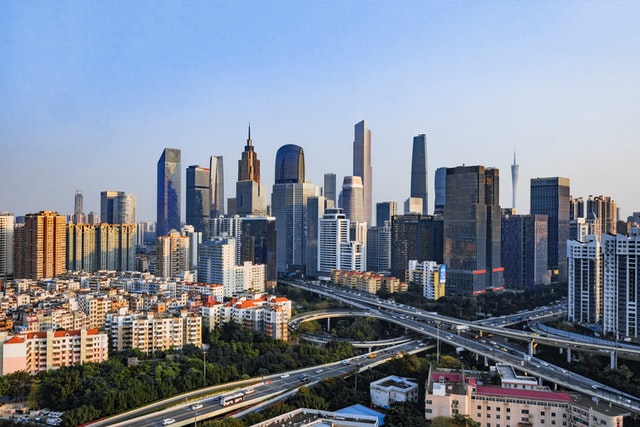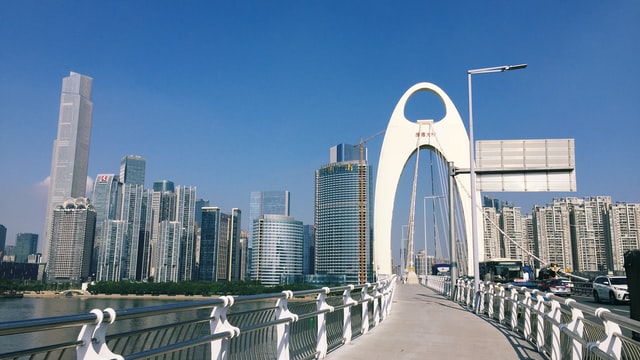Make the Most of a 72 Hour Free Visa in Guangzhou, China

This November, I bought a cheap flight with China Southern Airlines from Los Angeles to Guangzhou to see a friend before traveling to other parts of Asia. China’s third busiest airport, Guangzhou, would be an easy place to get another budget flight (such as with AirAsia) out of the country. Unfortunately, there are some countries you can’t just show up at – you need a visa. Because I hadn’t planned ahead, I wouldn’t have enough time to send away my passport and wait for the visa.
But visiting China wasn’t impossible. I could still exit the terminal and stand on Chinese soil – for free. The 72 hour free transit visa policy allows foreigners from participating countries to enter China from select cities–including Beijing, Shanghai and Guangzhou–on the condition that travelers show proof of departure from the same airport three days later. Since I already had a flight to Guangzhou, I decided to stay for three days before flying to Tokyo.
- Tip: When you check in for your flight to China, make sure to tell the airline that you will be applying for the 72 hour free transit visa. They will notify immigration. Make sure to have paper copies of your flight confirmation for departing the country, and accommodation reservations with correct addresses and phone numbers (they will call to verify you have a reservation). Once you have arrived in China, you will go to the “special” line where you will fill out paperwork to apply for the visa upon arrival.
I’m embarrassed to admit that I didn’t know much about China beyond your typical history lesson and the activists who grew their armpit hair for women’s rights. If you’re like me and have zero linguistic abilities, limited knowledge of China and are traveling solo on a budget, below is a list of helpful tips to make your three days as smooth as possible.
Do your homework before you go
Challenge: While I’m not a natural planner and much prefer to do what I feel like doingin the moment, planning during my three days in China made things easier. Most social media websites (Facebook, Instagram and Twitter) and all Google applications (Gmail, Google search, Google Maps, etc.) are blocked in China. Some people may get a VBN blocker, but often this still doesn’t allow you to access these websites.
Solution: Research activities, restaurant suggestions and points of interest prior to your arrival (or bring a guide book). Although I don’t usually bring hard copies of recommendations, like most places, internet can be unreliable, and because of internet constraints in China, I wanted to make sure I had what I needed. I even printed out Google Maps directions from my hotel to points of interest, and I’m glad I did. Locals use Baidu for navigation, which I found impossible as it is not in English. I also asked the front desk associates at my hotel for directions several times, but they gave me incorrect directions or strange advice; for example, insisting that I take a taxi when my destination was only five blocks away.

Getting around and trying to overcome the language barrier
A few days before leaving, I asked my friend in China whether she thought the language barrier was going to be a big issue for me. I would be in the city two days alone before she could see me. “It will be a huge problem,” she said, “but miming works wonders!”
Challenge: Despite being a transit city and trade hub, I didn’t encounter many people who spoke English. Being in Guangzhou was the most difficult place I had ever been in terms of communicating. It wasn’t like being somewhere where the tourism trail is strictly defined and multilingual people are scattered around. Even though the people I encountered were incredibly helpful, it was still frustrating at times to communicate confusions or ask for clarification.
Solutions: Download a translation app that can be used offline (I saw many people in China using Bing Translator). Memorize a few basic phrases in Cantonese and Mandarin, and carry a printed copy of them (including Chinese characters) for when your memory fails you. If you have a print out of an address of a restaurant or place you’re trying to go to, make sure to have the address written in Chinese characters. That way you can easily ask people for directions or show it to the taxi driver.
- Tip: The Guangzhou Metro, an extensive and foreigner friendly mode of transportation, offers a three day pass for 50 RMB (around $7 USD). Signs and loud speaker announcements are also in English.
Research what interests you
Challenge: Three days is a very short time. If you’re coming from another time zone, as I did, it can be even more of a challenge to adjust and fully experience the city. For such a brief visit, I didn’t want to get caught going to places that didn’t interest me. For example, if the Chinese Communist Revolution doesn’t interest you, don’t spend your day going to memorials and museums dedicated to the topic solely because they are listed on TripAdvisor. Although Guangzhou is a business center and rarely seen as a cultural destination, I was still able to find several contemporary art centers, which is what I love to do in a city.
Solution: Browse websites such as Pink Pangea, Culture Trip and Lonely Planet for alternative sightseeing ideas, and use a Twitter search to find blogs and other articles. Look up expat websites, such as Life of Guangzhou, for another perspective on the city. Try to meet up with locals or other travelers on Couchsurfing or MeetUp.
- Tip: Whatever you decide to do, don’t miss walking along the pedestrian areas of Beijing Lu and Shangxiajiu for consumerism at its finest, street food, youths, street entertainment and stunning temples in between the chaos. If, of course, that sort of thing interests you.
Don’t be afraid to eat out (alone)
Challenge: China was a new world to me. Completely unfamiliar with its customs, going out to eat was a confusing and exhilarating experience. It was like going abroad for the first time all over again. I was mesmerized by the expansive list of dim sum and endless options for herbal infusions. I was struck by the gruesome appearance of the sewed-up goose staring at me in the photos of the food advertisements.
Solution: I did light research on the local food customs and best restaurants to get the experience I was looking for. Lonely Planet and Culture trip has a great list of suggestions on where to eat. Bruneian food blogger Thanis Lim’s blog on Cantonese food gives restaurant suggestions and descriptions of local dishes. I was especially grateful for Thanis Lim’s blog when there was neither an English menu nor an English speaker, and I could simply show a picture of a dish he had ordered there.
Going alone to a restaurant isn’t a problem either. Many restaurants have shared tables where small parties or people dining solo are seated together. On my second night in the city, I visited Tao Tao Ju, a celebrated historic restaurant near Shangxiajiu. I shared a table with a middle aged gentleman, who ended up being a lovely dinner companion. Luckily, as a businessman from Hong Kong, he spoke English and we shared food, life philosophies and current events. When you travel alone, you are very seldom ‘alone.’
- Eating out tip: Make sure to bring your own napkins, as they are not often provided. Tipping is also not expected. In traditional restaurants, mark on the paper menu the dish you want and they bring you the bill immediately to the table. As your dishes come, the wait staff will stamp your bill to indicate it has been delivered. At the end of the meal you pay at the counter.
In 72 Hours, I spent a bit of it jetlagged, most of it lost and confused (and I mean literally going in circles for two hours) and all of it intrigued to learn more. No matter how travelers decide to spend their 72 hours, without having knowledge of the language or the country, we will undoubtedly encounter challenges. But with proper research and preparation, travelers can ease the confusion to a manageable level in order to fully enjoy the experience.
Photos for Make the Most of a 72 Hour Free Visa in Guangzhou, China by Unsplash.









2 thoughts on “Make the Most of a 72 Hour Free Visa in Guangzhou, China”